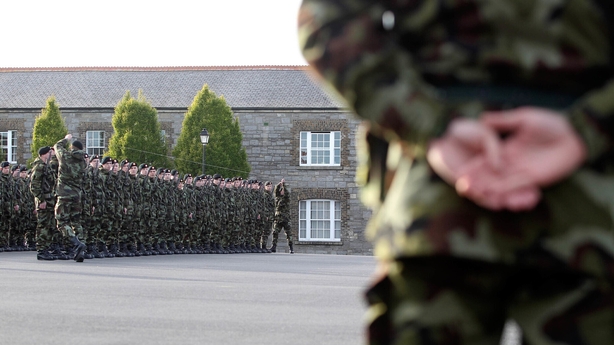Senior members of the navy and army have warned that the defences forces are caught in the grip of "catastrophe" when it comes to retaining staff.
The Association of Commissioned Officers (RACO) also warned that there is a "very small" chance that Ireland's naval fleet will be fully operational in five years.
Lieutenant Commander Cian O'Mearain, of the RACO Naval Service Committee, said that there are now "two ships at sea. That's two crews".
The Government has committed to raising that to "18 crews at sea, and another 18 crews ashore", he told the Oireachtas Committee on Foreign Affairs and Defence.
"Some of those people take between five and 10 years to train. So the likelihood of them being here in five years is fairly small," he warned.
While RACO's General Secretary, Lieutenant Colonel Conor King, said that "the defence forces have been in a state of slow decline for almost a decade now".
The rate of attrition is intensifying and becoming irreversible, he warned, pointing to army staff numbers.
"The ambition for 2028 is 11,500," he said.
But the defence forces current employ just two thirds of that figure, with 7,671 personnel.
"It just shows you that the policies are not working," he said.
"I think we have to call it a retention catastrophe at this stage," he told Sinn Féin's Matt Carthy, as the long-standing crisis has worsened.
'Abuse of a dominant position'
The senior officers laid the blame squarely at the feet of the current administration.
Lt Col King took aim at what he called the "dismissive and frustrating approach to our conciliation and arbitration scheme" taken by the Government.
He accused "the departments of Defence and Public Expenditure" of a "complete abuse of a dominant position".
"We are engaging in a process of review of our conciliation and arbitration scheme currently, and it is no exaggeration to say that if a real and meaningful change does not occur in the scheme, it is unfortunately dead," he warned.
"Last week this committee heard that over 95% of the early actions recommended by the Commission on the Defence Forces are now complete," Mr King said.
But he claimed that "very few are yet to have any real impact on the ground".

Pensions are a also key concern.
The post-2013 pension - called the single pension scheme - applies to more than half of the defence forces' personnel, and is the single biggest factor pushing people out of the service, he said.
"We see a lot of our captain members, for example, going to the civil service, into government departments where they can serve until 70-years-of-age, and get a full pension," he said.
Commandant Martin Ryan, RACO president, said that 79% of those recruited after 2013 say that they will leave the defence forces because of the pension.
It is an impending epidemic, he said.
Targetting drug traffickers
Successful operations against drug traffickers - as witnessed last week off the Cork coast involving the Army Ranger Wing and the Air Corps - depend on a well-trained and fairly treated defence force, Lt Col King said.
"Look at what was achieved last week with just one ship, one helicopter and highly qualified personnel in a joint operation with other state agencies and international bodies.
"Imagine what could be achieved if the defence forces were properly resourced", he added.
"Without adequately trained, motivated and incentivised personnel, the defence forces cannot contribute anything."
The defence forces "continues to prioritise costly labour intensive recruitment policy in favour of tangible retention initiatives," Lt Col King said.
"The unsustainably high turnover rate and assumption of additional tasks, such as the EU battlegroup, leads to the creation of a crippling operational and training tempo for the remaining service personnel."
He warned that this "leads to inevitable burnout and creates serious concerns for governance and the ability to manage risk and ensure the well being of our personnel".

